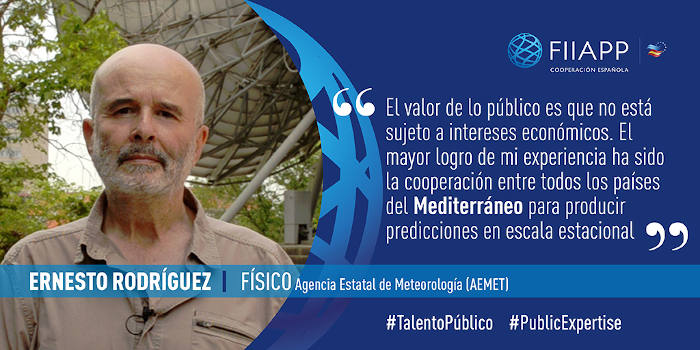-
24 August 2021
Category : Interview
#PublicExpertise: its value is that it is not subject to economic interests
Ernesto Rodríguez is a physicist with the State Meteorological Agency and part of FIIAPP's #Public Talent project, which is active in more than 100 countries. Read all about his experience here

What has been the greatest achievement of your time as a expert in cooperation projects?
The greatest achievement of my time as an expert has been the cooperation among all the Mediterranean countries to produce forecasts on a seasonal scale. This cooperation has included a lot of countries in deep conflict. I am referring to countries in the Near East such as Israel and the Arab countries and the countries of the former Yugoslavia. It has also enabled knowledge transfer, sharing the experiences of more developed European countries with countries where prediction on a seasonal scale was still nascent.
What are you most proud of?
Well, perhaps having helped to iron out difficulties between groups of countries that had practically no professional relationships, in this case in meteorology, as a consequence of the political framework. I think that having facilitated that cooperation is a source of pride.
How has your assignment contributed to improving the lives of people and the planet?
Well, everything to do with meteorology and climatology helps to improve our relationship with the planet and improves people’s lives. I mean on a seasonal scale, and projects that refer to climate change, climate change projections and impact studies to design adaptation strategies. That ultimately helps improve people’s lives.
That applies specifically to these adaptation strategies that end up being applied in certain sectors sensitive to climatic conditions. I’m talking about farming, water resources, and tourism, and that ends up affecting people’s lives.
The main value of this being a publicly-funded project is that it is not subject to economic interests, which is fundamental. In the end, public services are accessible to the majority of the population without prioritising whether or not it is profitable or if some economic benefit can be derived from an activity, task, or public institution. I think that is the main value of public services.
What have I learned from this experience?
Obviously, a whole lot. Firstly, to have learned about other professional points of view, other ways of working. Of course, it has also been very, very enriching from a personal point of view. And this experience has also helped me to see that, although there are conflicts, long conflicts, prolonged over time, in many regions and in many countries in our activity, these conflicts have been very easily avoidable. When it comes down to it, these conflicts are not reflected in the relationships between the people working on these projects.
The views and opinions expressed in this blog are the sole responsibility of the person who write them.




